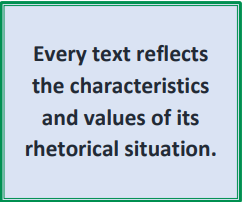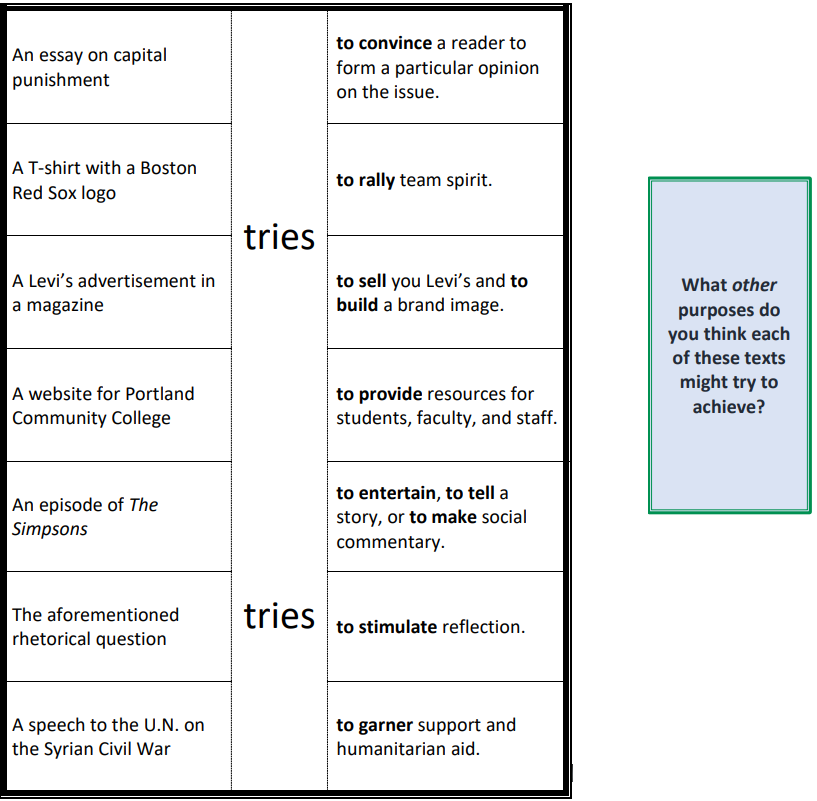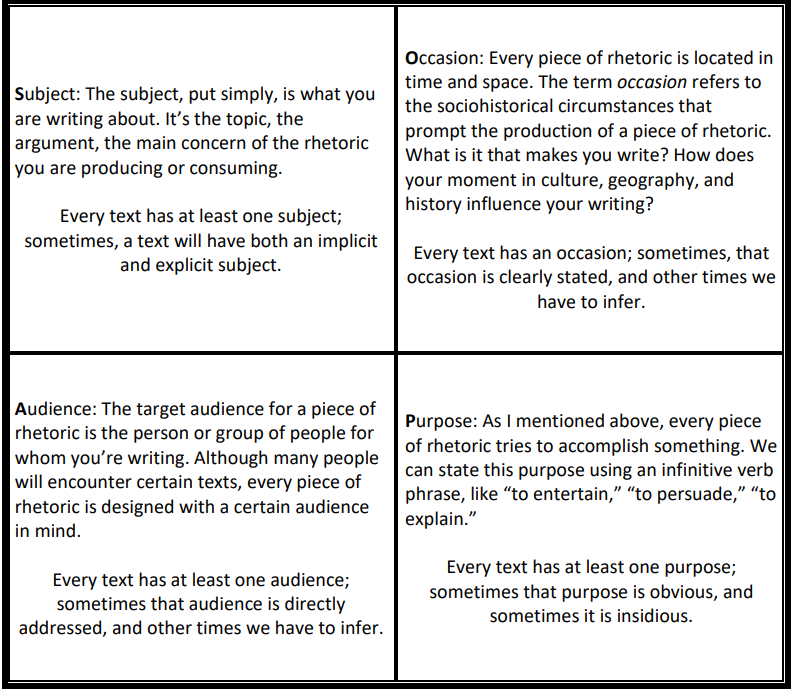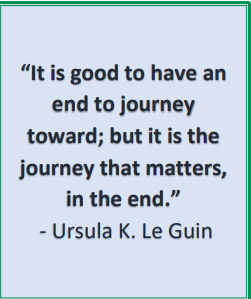General Introduction
- Page ID
- 70719
General Introduction
In a 2012 article published by The Washington Post's "Answer Sheet" section, curated by Valerie Strauss, John G. Maguire decries the failure of college writing students and their instructors. The article, "Why So Many College Students Are Lousy at Writing—And How Mr. Miyagi Can Help," explains that many students "enter college as lousy writers—and ... graduate without seeming to make much, if any, improvements."3 The problem? College writing classes don't teach good writing. The article scorns those writing courses which cover "rhetorical strategies, research, awareness of audience, youth civic activism—everything except the production of clear sentences."4
Maguire's article advocates for a return to old-school instructional methods—specifically, teaching style and mechanics so that college grads can produce clear, readable sentences. Maguire concludes with a reference to a 1984 film, The Karate Kid. (If you haven't seen it, the film is an underdog story about an outcast teenager learning martial arts from a caring but mysterious karate master, Mr. Miyagi.) Maguire asserts, "I'm a teacher, and I know what Mr. Miyagi did — he tricked the kid into learning. He got him to do important behaviors first, and didn't reveal where they fit into the overall skill until later." He continues,
So, according to Maguire, more teachers should "trick" students into learning grammar and style, only to reveal to the students at some faraway time that they knew how to write all along.
In case you can't already tell, I am very resistant to this article. I introduce it not because I have an axe to grind, but rather because I find it demonstrates essential misconceptions about writing that many people share. I have taken to teaching this text on the first day of class to show my students what they're up against: teachers, readers, parents, The Washington Post reporters, and many, many others who assume (a) there is one "correct" kind of writing, and (b) today's students have no idea how to execute it.
I refer to the perspective in the Strauss and Maguire text as the complaint tradition,6 and it's probably something you've encountered plenty of times. With every generation, some older folks can't wrap their minds around how terrible the following generation is. Those kids can't write, they spend too much time on their phones, back in my day we used to play outside and movies only cost a nickel. It's easy to write Miguire off right away here, but let's unpack a couple of key quotes to better understand what we're working against.
"[Colleges] should offer new writing courses that assume students know nothing about sentences and train new sentence behaviors from the ground up. Be repetitive and tricky—fool the kids into doing the right thing."7
Beyond the fact that such an assumption is simply rude, it also overlooks the fact that students actually already know a lot about using rhetoric—they do so on a daily basis, just not necessarily in the same register, style, or medium that Maguire wants. Designing a course and basing a teaching style on the assumptions that "students know nothing" would be a toxic and oppressive practice. As a student, you have dedicated yourself to learning, meaning you acknowledge that you don't know. But this is a far cry from "knowing nothing," and what you do know is not inherently less valuable than what Maguire knows.
Furthermore, I do not believe in "repetitive and tricky" teaching that pretends to know what's best for students. Don't get me wrong, I love Karate Kid, but teaching grounded in deceit reinforces the toxic power dynamic mentioned above. it assumes that teachers know best, and that their students deserve no power in their learning environment. Teachers are not "better than" or "above" students: we have had certain experiences that position us to offer help, but that doesn't give us license to lie to you.
Most importantly, though, I believe that pedagogy should aim to be transparent. In order for you to claim the knowledge and skills you gain in a learning community, you need to see how you're building it, be invested in why you're doing certain work, and respond to feedback on your thinking and writing processes.
So Maguire and I have our differences on teaching philosophy; we disagree on the nature of the teacher-student relationship. If it ended there, we might 'agree to disagree.' But Maguire also drastically misunderstands the characteristics of good writing.
"The student writer's goal should be the mastery of the readable style."8
Not unrelated to his beliefs on teaching and learning, Maguire's belief in a monolithic goal of "readable style" is loaded with problematic assumptions about
a) what the student writer's goals are, academically, personally, and professionally,
b) whether "mastery" is a reasonable goal for a foundational college course, and
c) what "readable" style is.
A) Your learning community—you and the people around you—have drastically different futures ahead of you, both in school and beyond. To assume that you all want the same thing out of your writing class is myopic.
B) You will learn plenty about writing in this book or in your class. But let's be realistic: even professional writers rarely consider themselves masters. Writing, like any art or skill, requires ongoing, lifelong practice and refinement. You will not be a master after 10, 14, or even 28 weeks—but you can always grow and improve.
C) What counts as “clarity” or “quality writing” is never static: it is always shifting as you enter new rhetorical situations. In short, “good writing” depends on who’s reading, who’s writing, why they’re writing, when and where they’re writing, and what they’re writing about. “Good writing” means differently to different people in different places and different times.9

Rhetorical Situations
Throughout this text, you will be challenged to respond to different rhetorical situations through the act of writing. In other words, you will try to learn more about what "good writing" says and does in different contexts: What makes for a good story? An insightful analysis? A convincing argument? Why does it matter that we write where and when we do? What do different readers want out of a piece of writing?
By exploring and writing within different situations, you will learn skills for a specific rhetorical modes, sharpen your critical literacy, and—most importantly—learn to adapt to a variety of writing circumstances that you will encounter both in and out of school. In other words, practice in different rhetorical situations will make you a more critical consumer and producer of rhetoric.
But let’s back up a second. What’s rhetoric?
You may have heard of a rhetorical question before—a question that someone asks you without expecting an answer. What’s the point of asking a question with no answer? To somehow impact the person who hears it, maybe by making them think about an issue in a different way.
According to the Oxford English Dictionary, rhetoric is “The art of using language effectively so as to persuade or influence others, esp. the exploitation of figures of speech and other compositional techniques to this end.”10
Very generally speaking, rhetoric refers to a set of strategies that authors use to connect to their readers. More often in this book, though, I use “rhetoric” to refer to any text that tries to do something to a reader, viewer, or listener. Vague, I know, but let’s consider some examples that require such a vague definition:

Each of these texts is rhetorical. Texts can be written or spoken; they can be images; they can be video; they can be digital or printed; they can exist for only a moment or for eons. What they try to accomplish can vary widely, from killing time to killing people.
A pattern might be emerging to you: you are perpetually surrounded by rhetoric, but you are not always aware of how it’s acting on you—no one can be. But by developing your rhetorical awareness, you can perceive and interpret texts more diligently, in turn developing skills to think more independently. For that reason, this book encourages you to be both a critical consumer and also a critical producer of rhetoric, specifically in the written form.
In this book, you will explore and work within three rhetorical situations. (The beauty of the rhetorical situation, of course, is that no two writers using this book will have the exact same constraints; nevertheless, you will share similar experiences.) Because many college composition programs value the nonfiction essay form, this textbook focuses on three different kinds of essays: a personal narrative, a textual analysis, and a persuasive research essay. The goal of writing these essays, though, is not to become a master of any of them. Instead, the goal is to practice interrogating the rhetorical situations and tailoring your work to be more effective within them.
Because the writing you will do throughout your life will take drastically different forms, you should learn to ask the right questions about the writing you need to do. Instead of learning rules for writing (rules which will invariably change), it is more valuable to learn the questions you should ask of your future writing situations and produce texts that are tailored to those situations. Whenever you create a new piece of writing, you should ask, What will make my writing most effective based on my rhetorical situation?
Every text comes into being within a specific rhetorical situation and reflects the characteristics and values of that situation. Although there are many ways to break down a rhetorical situation, I use the acronym SOAP for subject, occasion, audience, and purpose.11 These are distinct elements, but they often overlap and inform one another. Let’s take a closer look:

Identifying these elements is only step one. What matters more are the implications that each of these elements carries. For each text you create, you should ask What is my subject? What is my occasion? Who is my audience? What is my purpose? But you should also ask How do each of those answers influence the way I will write?
For instance, the subject of the story of your weekend might change when you’re telling your grandma instead of your friends. Your language will change as your audience changes: if you’re writing a story about giraffes for a classroom of third graders, you’d better use different word choice than if you’re writing a meta-analysis of giraffe population metrics for the Executive Board of the Oregon Zoo.12 Similarly, you can imagine that writing a blog about standardized testing would be different in 2003 from the same writing in 2017. Throughout this book, I encourage you to think critically about these rhetorical situations because there is no one version of “good writing.” There is only rhetoric that is effective in its situation. Any such rhetoric is crafted through process.
Writing as Process
Good writing is a lot of different things, and those things are largely dependent on rhetorical situation. But how exactly do we produce effective, situationally appropriate writing with an always-moving target?
The answer lies in the difference between writing as product and writing as process. The word “writing” itself can be both a noun and a verb: a piece of writing, or the act of write-ing. Although your process will eventually lead to a product, I emphasize awareness of process to more deliberately think through the techniques and ideas that you encounter leading up to that final product in that specific situation.
Take a few minutes to think about your own writing process. From the moment a writing project is assigned to the moment you turn the paper in and wash your hands of it completely, what happens? What are the ingredients you’ve found necessary to a successful recipe, so to speak?
Your answer might include the things you see on posters in high school English classrooms—pre-write, research, draft, revise, etc. —but it also likely includes some other factors— procrastination, dance breaks, coffee, existential dread, snacks, etc. You should especially account for the things that make your process unique. One great example is your environment: some writers prefer silence in the library; others listen to music at their desk; still others like working in a coffee shop with conversational hum in the background.

As you challenge yourself with new writing experiences, experiment with your process. By this point in your academic career, you’ve probably already found something that works pretty well for you, and you should give yourself credit for that. But it doesn’t mean you can’t enhance your process. If you’re someone who usually outlines before a draft, try a free-write or a mindmap—or just jumping right into the draft. If you usually listen to music, try a different genre. If you usually fall prey to procrastination, try to bust out an early draft, give yourself a day or two off, and then come back to it.
For all the differences in individual processes, every effective writing process is iterative: unlike the neat diagrams on posters in high school English classrooms, writing requires you to circle back, repeat steps, bounce around in sequence. It demands that you write, rewrite, rerewrite. It asks you to make revisions on every scale of your drafts. Like building muscle, improving your writing (as product) and your writing (as process) require repetition, dedication, and labor over time.
In summary, remember these three key ideas:
1) SOAP and the rhetorical situation.
Writing is never "good," "bad," "right," or "wrong" in and of itself: it can only be these things relative to the constraints of the rhetorical situation.
2) Process.
Writing is more than just putting words on the page. It begins with a careful consideration of the rhetorical situation and proceeds through recursive idea generation, drafting, and revision. Writing is never truly finished.
3) What to expect from the book.
EmpoWord will provide you the opportunity to experiment within different rhetorical situations to help you practice for future rhetorical situations. Alongside the work you do in class, the book will encourage you to work through complex writing and thinking processes to create rhetorically effective essays. These essays anticipate the kind of writing you will do both in school and beyond because they will give you the chance to practice asking the right questions of your rhetorical situation.
With these ideas in mind, I wish you Happy Writing!
Chapter Vocabulary
| Vocabulary | Definition |
| audience | the intended consumers for a piece of rhetoric. Every text has at least one audience; sometimes, that audience is directly addressed, and other times we have to infer. |
| complaint tradition | the recurring social phenomenon in which a generation complains about the way things have changed since their earlier years. Coined by Leonard Greenbaum. |
| iterative | literally, a repetition within a process. The writing process is iterative because it is non-linear and because an author often has to repeat, revisit, or reapproach different steps along the way. |
| learning community | a network of learners and teachers, each equipped and empowered to provide support through horizontal power relations. Values diversity insofar as it encourages growth and perspective, but also inclusivity. Also, a community that learns by adapting to its unique needs and advantages. |
| medium | the channel, technology, or form through which rhetoric is constructed and communicated. Different rhetorical situations value different media, and different media value different kinds of rhetoric. |
| mode | the style and techniques employed by of a piece of rhetoric to achieve its purpose. Different rhetorical situations value different modes, and different modes value different kinds of rhetoric. Compare to genre. |
| occasion | the sociohistorical circumstances that prompt the production of a piece of rhetoric, determined by personal experiences, current events, language, and culture. Every text has an occasion. |
| process | a complex and multifaceted sequence that results in a product. As applied in “writing process,” non-linear and iterative. Contrast with product |
| product | the end result of a creative process. Often shows little evidence of the process that created it. |
| purpose | the intended result of a piece of rhetoric. Can be stated using an infinitive verb phrase (“to entertain,” “to persuade,” “to explain”). Every text has at least one purpose, sometimes declared explicitly, and other times implied or hidden. |
| rhetoric | a combination of textual strategies designed to do something to someone. In other words, ‘rhetoric’ refers to language, video, images, or other symbols (or some combination of these) that informs, entertains, persuades, compels, or otherwise impacts an audience. |
| rhetorical situation | the circumstances in which rhetoric is produced, understood using the constituent elements of subject, occasion, audience, and purpose. Each element of the rhetorical situation carries assumptions and imperatives about the kind of rhetoric that will be well received. Rhetorical situation will also influence mode and medium. |
| subject | the topic, focus, argument, or idea explored in a text |
| text | any artifact through which a message is communicated. Can be written or spoken; digital, printed, or undocumented; video, image, or language. Every text is rhetorical in nature. See rhetoric. |
General Introduction Endnotes
3 Strauss.
Maguire, John G., with an introduction by Valerie Strauss. “Why So Many College Students Are Lousy at Writing—and How Mr. Miyagi Can Help.” The Washington Post, 27 April 2012, https://www.washingtonpost.com/news/answer-sheet/wp/2017/04/27/why-so-manycollege-students-are-lousy-at-writing-and-how-mr-miyagi-can-help/.
4 Maguire.
5 Ibid., emphasis added.
6 Greenbaum, Leonard. “The Tradition of Complaint.” College English, vol. 31, no. 2, 1969, pp. 174–187. JSTOR, www.jstor.org/stable/374119.
7 Strauss and Maguire.
8 Ibid.
9 It’s worth noting that most singular definitions of “good writing” are deeply entrenched in racist, sexist, and jingoist prejudice. This is not news to the National Council of Teachers of English, who originally published “Students’ Right to Their Own Language” in 1974, nor to Asao B. Inoue who recently published an outstanding textbook on the matter. Maguire missed that memo, I suppose.
10 “Rhetoric.” Oxford English Dictionary, 2018, http://www.oed.com/view/Entry/165178?rskey=CYNdOm&result=1&isAdvanced=false#eid.
11 Also worth consideration are mode and medium, which are often closely related to SOAP, but not explored in-depth in this book. This acronym comes to me courtesy of Daniel Hershel.
12 Granted, these examples are also in different rhetorical modes, but you get the point.
Ursula K. Le Guin quote on p. xlviii is from The Left Hand of Darkness, Ace, 1987. Le Guin, 220.

